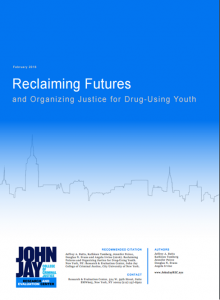By Bridget Murphy, September 21 2016
Researchers from John Jay College of Criminal Justice (John Jay) have been involved in evaluating Reclaiming Futures since its inception. Beginning in 2002, Jeffrey Butts, PhD and colleagues began studying the relationship between the Reclaiming Futures’ system-level change approach and the way stakeholders across all the inter-connected systems in juvenile justice settings perceive the effectiveness of their system of care and the delivery of services to youth. In his approach, Dr. Butts examined variables in key domains like administration, collaboration and quality. While no evaluation is perfect, the work Butts and colleagues did to begin to quantify system-level change variables in a meaningful way was quite original and generated useful information for Reclaiming Futures and the field. The initial evaluation results were also helpful in guiding subsequent evaluations by The University of Arizona, Chestnut Health Systems, and Carnevale Associates, LLC.
In Reclaiming Futures and Organizing Justice for Drug-Using Youth (Butts, Tomberg, Peirce, Evans & Irvine, 2016), John Jay researchers begin by reviewing Reclaiming Futures history and previous evaluations: the strengths and shortcomings and then report findings from a survey of Reclaiming Futures sites around the country that served as a follow up to the original community networks analysis conducted a decade ago (Butts and Roman, 2007). While there are numerous interesting qualitative and quantitative aspects to this report, I found the follow up to the community networks analysis very relevant and practical. Butts and colleagues contacted sites that participated in the 2003 and 2006 analysis to collect a third wave of data. The researchers asked Reclaiming Futures leadership to rank each site on its “relative level of engagement” with the National Office and Reclaiming Futures activities and events (p. 13). Then, the researchers examined these site-engagement rankings relative to several survey indices. The investigators found that sites that remained strongly engaged showed significantly better perceptions of “access to services” (e.g., location; funding) as compared to those with weak or no engagement. They also found statistically significant differences in “resource management” (e.g., sharing resources; efficient use of existing funding) with sites that were more strongly engaged reporting better resource management scores than sites with less strong or no engagement. Similarly, engaged sites reported more positive perceptions of their alcohol and other drug assessment practices as compared to those with less engagement.
So how is this relevant or practical?
We see in these findings as evidence that ongoing engagement with Reclaiming Futures and our National Learning Collaborative can help sites to sustain the effective system of care practices they learned as members of our national community. Even for sites whose initial Reclaiming Futures funding may have expired, jurisdictions that remain engaged with the national Reclaiming Futures community, continue to benefit from the peer-to-peer as well as national expert led exchange of information. This may in turn lead to increased knowledge that builds local capacity and connections within the field. That is, engaged sites may find that the Reclaiming Futures Learning Collaborative and other collaborative opportunities provide them with current and relevant information about trends, evidence- and practice-based models that can be implemented locally. The results do not tell us the “why” of these findings; rather, they offer us the opportunity to ask additional questions; consider our own engagement levels, and how remaining engaged might be beneficial to our systems.
What are your thoughts about this finding?
If you have not reviewed this report, I encourage you to do so. If you are affiliated with a Reclaiming Futures site, think about how your level of engagement with our national collaborative has shaped your efforts. If you are not affiliated with Reclaiming Futures, think about how engaging with us might help your jurisdiction to improve systems, services, and supports for young people and their families involved with the juvenile justice system.
Author acknowledgements: Many thanks to Evan Elkin, Executive Director for his contributions to this blog post.
Updated: May 31 2017

